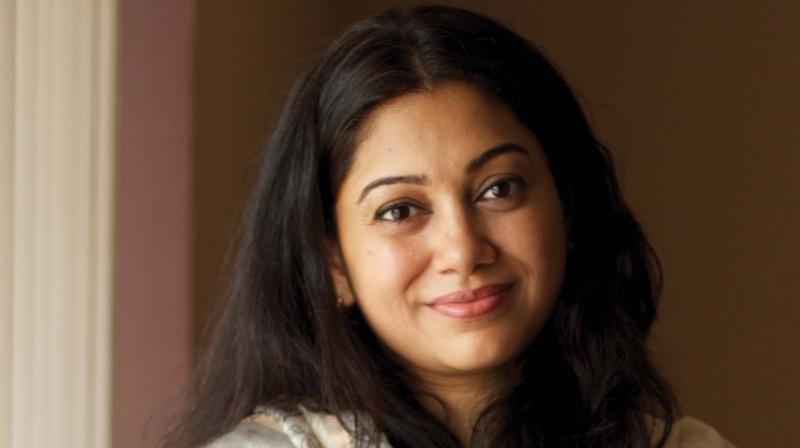Celebration of togetherness
Director Anjali Menon opens up about her hiatus and the upcoming film Koode.

“It is a domestic Sunday morning,” she says laughing as the interview begins. Anjali Menon, who is back home from the work of Koode, her fourth film after Manjadikuru, Ustad Hotel and Bangalore Days, is slowly returning to her routine. “I finally got to do my morning walk in the rain,” she chuckles. Her Koode is all set to hit the screens on Saturday. What is your expectation? “I don’t know,” she says and then adds, “Not expectation. It is hope. I hope to connect again.” Yes, it is this ‘connect’ that draws the audience to her movies. In other words, crave for her films.
Now, Anjali is back after four years. Ask her where she had been all these years, she asks, “At the end of the day, it is my choice, right?” It is a personal reason, she says. “I wanted to spend some time with my son. He was two years old while I was working for Bangalore Days. It was difficult to stay away from him. After Bangalore Days, I was convinced that I wanted to spend time with him. I didn’t want to miss out on the most beautiful years of his life. So I decided I would go back to shoot only after that,” says Anjali, who started writing Koode last year.
“When the thought of making such a film came up, I discussed it with certain people I had in mind. Then, I took some time to write it,” she says. When the songs of Koode featuring Prithviraj, Parvathi Thiruvoth and Nazriya released, what struck the audience were those scenic shots, especially the misty ones. “It was shot in the outskirts of Ooty,” says Anjali. “The movie required a certain mood. It needed a space away from the urban area. We actually began our location scout from Wayanad and travelled through the entire belt. And somewhere there we found the land of Joshua, the protagonist,” she adds. The shooting was during extreme weathers. They had to shoot right in the middle of winter. But it was a happy journey. “I think, as a crew, you really bind together,” she smiles. It looks like their togetherness and that of the characters got translated into the title of the movie. The word Koode carries a lot of emotions with it. “I didn’t have a title while working on it,” she says. “I had a discussion with my lyricist Rafeeq Ahammed about the movie and had asked him for title suggestions. One day, I just got a message from him saying Koode. And it stayed with me. Nothing else can signify the movie better. We are what we carry with us – our baggage, fears, thoughts, and moments,” adds Anjali, whose films are known for its multi-starrer element.
“After every film, I say that I want to make my next movie with one or two actors. But I think there is a mad writer in me who likes people a lot,” she laughs. “By the time I write, there would be many characters in it. Then, actually, I have to take some away. I feel that as a flow. In terms of the number of characters, I think I am more focused in Koode. It is more about the character Joshua. It is his journey. The movie explores his mind,” explains Anjali. She says she chooses subjects that strike a chord with her. “I consider myself as audience. The subject should inspire me first,” she says. One beautiful aspect of Anjali’s movies is the little acts that say a lot about the character and situation. One such sequence in Bangalore Days is when Das (Fahadh) comes to Natasha’s (Nithya Menen) home. Her dog recognises him; he too becomes emotional. That single moment shows the audience his lovable side. “When we make a movie, we don’t know which element is going to connect with the viewer. I define the character and their experience in life,” says Anjali. The dog sequence was not there in the initial draft. The thought of humans connecting to pets struck her during a discussion with her brother about pets. And it stayed in her mind. Then, Anjali wanted to know whether Fahadh was comfortable with dogs. And he readily agreed to it. “That part explains more about Das, who has so much love within. You cannot put that into dialogue,” she says.
And that was something that she wanted to try in Koode. “In Koode, I didn’t completely rely on dialogues. There are dialogues , but many things are not communicated in spoken words. They are said in far more interesting ways. That is something I really enjoyed doing,” says Anjali, hoping that it would connect to the audience. A member of the Women in Cinema Collective (WCC), she feels that the experiments and changes that occur on the screen should reflect off-screen as well. She sees the current transformation in the industry as a good sign. “There are many things that have to change. It is not about one individual or a group of individuals. It is much beyond that. It is important to see it in that way,” she says. “The transformation will take its time. But it has to happen. The change is happening worldwide. Naturally, that will happen here too. It is important to hold onto traditions. But, when we recognise that something is not working, we need to find a solution. It is important to realise the need of the hour and do something about it,” she signs off.

